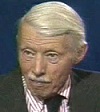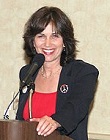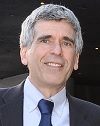“Magnificent. I was most moved…the old hope welled up in me again.”
Bernard Wolfe (1915-1985), author of The Great Prince Died (also published as Trotsky Dead). In 1937 he served briefly as secretary to Leon Trotsky during the latter’s exile in Mexico.
“You were, of course, entirely right in your supposition that I would like and appreciate 1983. It is to me not only a dialectical novel; it is a fascinating one, full of interest and insight into the stress and strains of Soviet society—and, to be certain, I found the analysis of Soviet ‘Marxism’ extraordinarily revealing, incisive and penetrating…
“I cannot but be reminded of Chernyshevsky’s ‘What is to be Done?’. The technique is so similar; the characters are so much alike in their questing idealism…
“Of course, no one can know whether something like this scenario will occur; but it has the strong ring of truth about it.”
Harrison Salisbury (1908-1993), an American Pulitzer Prize-winning journalist (1955), was the first regular The New York Times’ Moscow bureau chief from 1949-1954.
“Anthony Saidy’s 1983 is a time capsule with a sense of history, challenging conventional wisdom about the Soviet experience and containing that irrepressible hope for very different future. Think of it as a dialectical, political page turner.”
Susan Weissman, PhD, is an Associate Professor of Politics at Saint Mary’s College of California. She is the author of Victor Serge, as well as many articles on Russia and the former Soviet Union. Recipient of the 1999 “Mover and Shakers Award” from the Southern California Library of Social Studies.
“I was fascinated! Loved it – and boy, did it resonate with my organizing experience (minus, thankfully, the intensity of police state activity in the USSR at the time; though surveillance is never far from dissidence, we learn!)….the conversations and the action drove me forward – I wanted to know what happened.”
Mimi Kennedy, Actress, Author,
Chair, Progressive Democrats of America.
![]() This review is for: 1983. A Dialectical Novel
This review is for: 1983. A Dialectical Novel
“Anthony Saidy’s novel 1983 rolls back the tape on the collapse of the Soviet Union, replaying history to make change intentional rather than circumstantial, with characters acting alone and in concert to challenge the status quo, most notably the lack of free speech, the dehumanization of industrialization, and the militarization of society. Though the novel is fictitious, the reader is well aware that Saidy’s characters reflect the struggles and doubts of the disillusioned. The author reveals two distinct groups driving the collapse: dissident intellectuals and the working class. In so doing, the reader is privy to provocative and heady conversations about the meaning of Marxism, including a challenge to the notion that communism is simply about the eradication of private property. Says one intellectual, Valya, to another named Alek, “Marx never lost sight of the worker’s relation to the act of capitalist production, where his labor is alienated from him. Instead of labor as a creative unfolding of human talents, the worker becomes a mere appendage of the machine as he produces surplus product for the capitalist.” Consequently, it’s more of the same – under authoritarian socialism as run-amok capitalism, with workers feeling alienated and diminished by their daily drudgery. Ivan, a car factory employee, crouching, straightening, bending again, distracts himself from assembly line tedium by thinking of recent soccer games. “What else to do when the cursed line never seemed to stop?” Tension between the state and its workers escalates when the leadership of the Communist Party announces workers will have to work overtime, (unpaid labor), to defend the Soviet Union against Chinese aggression. Contempt for the Chinese will surely take the focus off the shortcomings and oppressive nature of the Soviet State. Not so fast. A war between socialist states makes no sense to those who must sacrifice to support it. Suspense mounts as the disaffected debate how best to sack the empire and create something new and vital. Perhaps an assassination is order – but, no, ” it changes nothing but one name at the top.” Anyone schooled in organizing will appreciate the decision to mobilize the masses – an act that threatens grave consequences. 1983 – a novel that keeps hope and idealism alive, while reminding us that no empire lasts forever. Read it, but don’t weep. It has an uplifting ending.
Marcy Winograd is the author of Lola Zola and the Lemonade Crush, a novel for tween girls.(www.lolazola.com) A public high school English teacher, Marcy helped organize OccupyLAUSD to protest education budget cuts. In 2010, Marcy mobilized 41% of the Democratic Party primary vote in her peace challenge to incumbent Blue Dog Congresswoman Jane Harman. Advocating a Blue-Green coalition to elect Greens for every non-partisan office, Marcy serves on the California Green Party’s statewide assembly on ballot initiatives and often guest-hosts for Lila Garrett on radio station KPFK’s (90.7 FM/LA)
![]() This novel can grab your intellect and your heart
This novel can grab your intellect and your heart
“This truly is a dialectical novel. It’s rooted in a place and time — the Soviet Union of thirty years ago — while it transcends that place and time. The quest for democracy, transparency, honest politics and peace is with us today, here and now in the USA. This novel runs on personal and political tracks, the individual and the macro; as they converge, so does the story and its meanings. Still with us today.
The author presents a story that’s apt to sneak up on us. At first it seems simple — but it’s far from simple. At first it may seem merely intellectual — but it’s far from simply cognitive. This novel goes to the heart of matters of human subservience and courage. And our potential, always present but rarely realized, to break out of internalized limits that prevent the flowering of our creative striving for solidarity, active love and realized freedoms.”
Norman Solomon American journalist, media critic, antiwar activist, and was a candidate in 2012 for the United States House of Representatives. Solomon is a longtime associate of the media watch group Fairness & Accuracy In Reporting.




